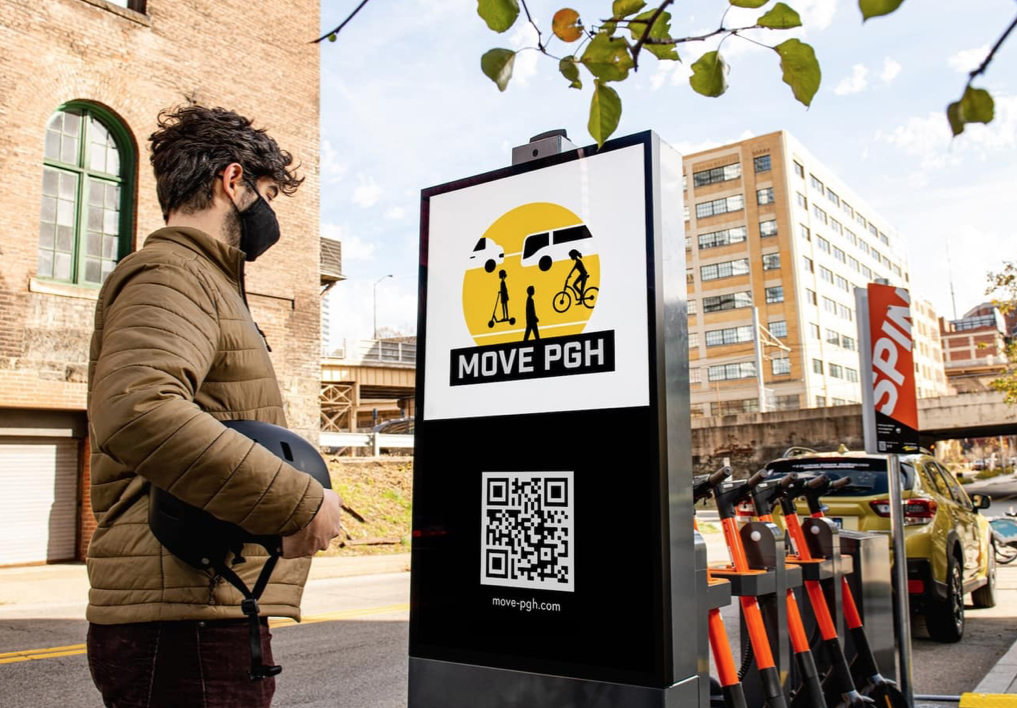The last few months scooters have been everywhere in Pittsburgh. Sometimes even popping up in unexpected or even dangerous places. They can be annoying, but they are part of a new healthier urban infrastructure that can save us money, make us healthier and improve our quality of life. Looking at the bigger picture, combining new mobility options such as e-scooters and e-bikes with smart urban planning will help Pittsburgh participate in global decarbonization and reduce oil prices while making short trips cheaper, safer, easier and maybe even more fun!
One reason that e-scooters are so logical is that most car trips are short and can be easily replaced with other modes of transportation. According to the 2017 National Highway Transportation Survey , 60% of car trips in the US were 5 miles or less. With the right combination of protected bike lanes, sidewalks, and neighborhood greenways many of those trips could be made by e-scooter, bike, e-bike, or simply walked. The planning and infrastructure required to make it easy to take short trips by e-scooter also make it easier to get around by walking or biking. Think about how much more pleasant it would be to get around Pittsburgh if even half of the drivers on short trips switched to e-scooters or e-bikes!
Another benefit to switching short trips from cars to micromobility options is that it could mean cheaper gasoline for those who stay in their cars. The reason is obvious, but often overlooked. Less driving means less demand for gasoline and less demand means lower prices. The impact is exaggerated by the nature of the oil industry. Oil production projects take years to develop and it’s a slow and expensive process for oil companies to increase or decrease their production. That’s why oil prices crashed when the start of the COVID-19 pandemic abruptly reduced oil demand and it’s why oil prices are so high right now as demand is increasing after oil companies reduced supply in 2020. Now that demand for gasoline is rising, they aren’t increasing production so prices are skyrocketing.
As short car trips are replaced by electric bikes and scooters we could see the opposite effect. Demand for gasoline could drop faster than oil companies can cut production. A process that we at Skibo Energy call rapid substitution.
It’s certainly true that some safety issues have arisen in the pilot e-scooter programs. That’s normal for a new form of transportation. The Pittsburgh City Council is right to play an active role in adjusting traffic regulations based on the experience of the pilot program. Hopefully, the city will also continue to look for ways to make the program better by making it easier for people to find safe routes to ride and continuing to integrate these with public transportation as with the Move PGH program.
New forms of transportation provide an opportunity to rethink the best ways to make the public safe. Spin’s policy of automatically preventing e-scooters from accelerating outside of designated areas is an example of using technology to rethink safety.
The e-scooter pilot program provides an ideal opportunity for the City of Pittsburgh to participate in global decarbonization while at the same time helping to reduce the global price of oil, and making transportation safer, easier, cheaper and more fun!
Sources
https://www.bloomberg.com/news/articles/2020-04-20/the-oil-price-crash-in-one-word-inelasticity
https://nhts.ornl.gov/vehicle-trips
https://www.epa.gov/greenvehicles/what-if-we-kept-our-cars-parked-trips-less-one-mile
https://nhts.ornl.gov/vehicle-trips
https://www.skiboenergy.com/post/are-we-approaching-a-permanent-collapse-of-oil-prices



